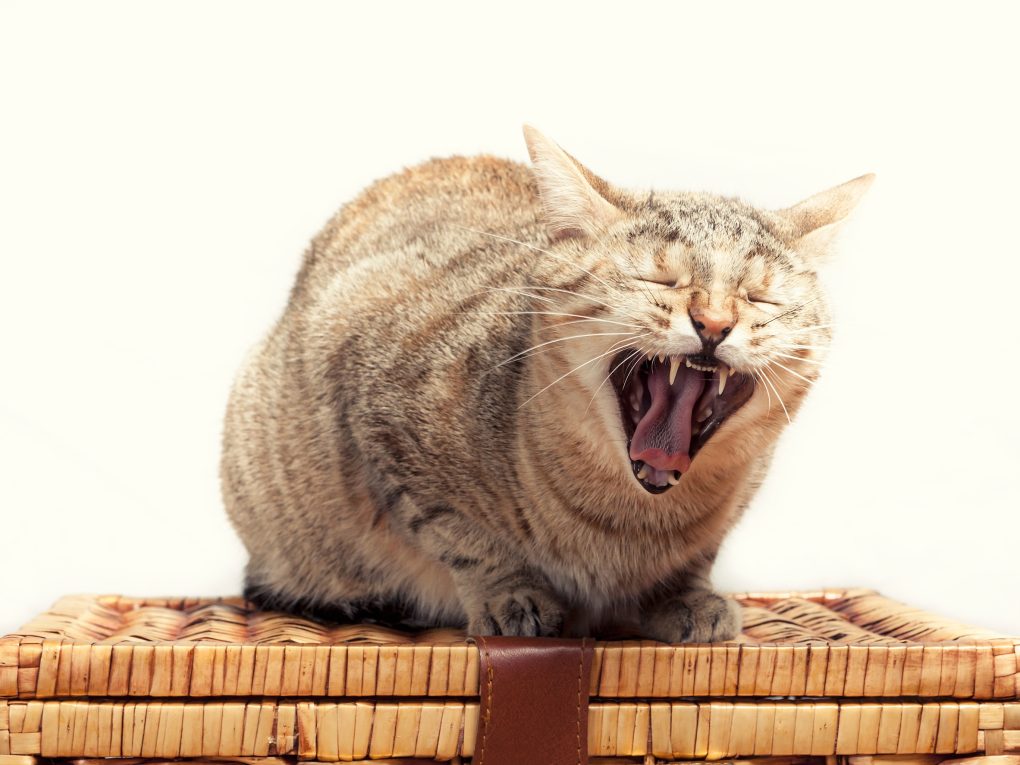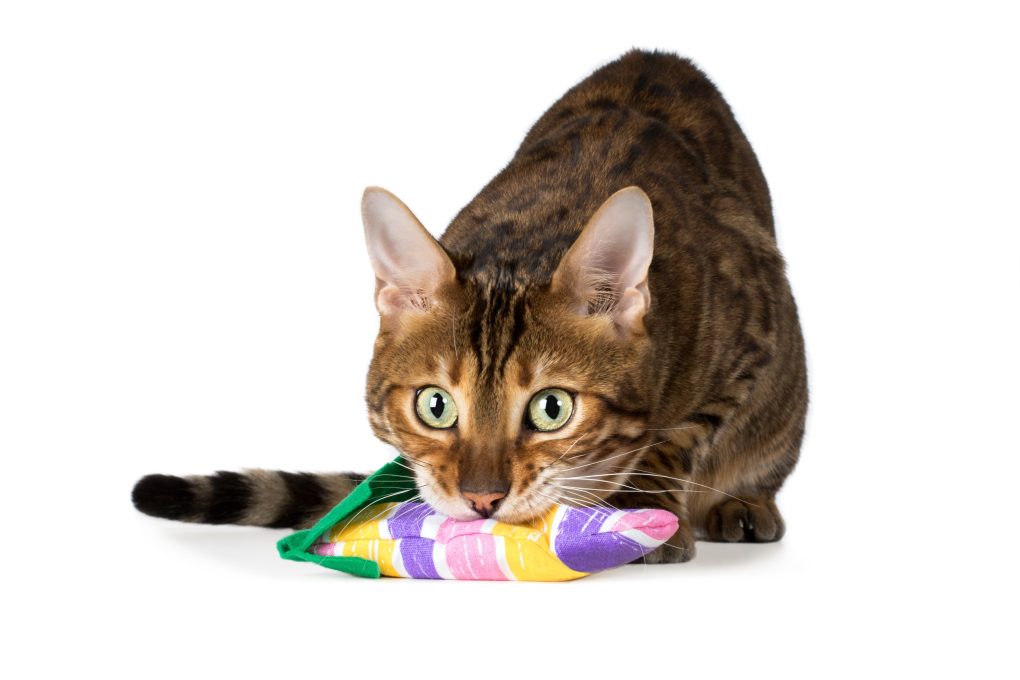Why Does My Bengal Cat Bite Me: Reasons This Breed May Bite and How to Keep It From Doing So
Your Bengal cat may bite you due to playfulness or hunting instincts, or it could be a sign of aggression or fear. It’s also possible that your cat is trying to communicate that it’s in pain or uncomfortable. It’s essential to observe your cat’s behavior and consult a veterinarian or animal behaviorist to determine the cause of the biting and how to address it.
In addition, when a Bengal cat is stimulated (e.g., playing with toys, being petted, or trying to get attention), it may bite to show that they’re feeling excitement or stimulation. However, when a Bengal cat is bored, it may also bite in an attempt to engage with its surroundings or someone nearby.


If you think your cat might be biting due to boredom or stimulation, try providing them with more toys and activities to keep them occupied and away from you. For example, if your cat is biting out of the blue, it may be a sign that something is bothering them (either emotionally or physically).
Table of Contents
Reasons Bengal Cats Bite
Boredom
Bengal cats have playful and affectionate behaviors, but they can bite when they’re getting bored. If they don’t have enough stimulation, they may turn to biting to release pent-up energy or express their frustration. They may also bite to try and get your attention.
If you suspect that your cat is getting bored or is biting because he’s restless, you can try some of the following tips: provide them with toys to play with or engage them in other activities; put them in a room with several different objects to explore; and introduce new people or animals into the home gradually.
It’s also important to note that if your cat is biting you, it’s important not to give them attention or play, as it may reinforce this behavior. Instead, it would help if you redirected their energy to a toy or a treat or gave them a break. By engaging your cat in play and giving him toys and opportunities to exercise, you can help keep him occupied and from biting excessively.
Playfulness
Bengal cats can be playful and bite when they’re playfully swatting at their owners or other cats. This behavior can occur when the cat is hungry or protecting its territory. This type of biting is usually not aggressive but a natural part of their hunting instincts. For example, they may bite and “hunt” their toys, or even your hands or feet, as part of their play behavior.
If your Bengal cat’s play biting becomes too rough, or you’re not comfortable with it, it’s essential to set boundaries and teach them appropriate play behavior. For example, you can use a firm “no” or “stop” and redirect their attention to a toy or treat or give them a break. It’s also important to socialize your cat early to help them understand appropriate play behavior and build a good relationship with humans.
Bengal cat bites are usually harmless and can be treated with simple steps, including cleaning the wound with antibacterial ointment and having the cat examined by a veterinarian. If you’re concerned about a bite from your cat, don’t panic – it’s usually not severe and can be treated easily. Instead, try keeping the cat indoors to reduce the risk of injury.
Aggression


Bengal cats can be aggressive when threatened or when they are feeling territorial. When Bengal cats bite, it is usually out of excitement or to assert dominance over other cats in the household. Some other common causes of aggression in Bengals include lack of stimulation, separation from their family, and being mishandled.
They can also be more assertive and less tolerant of handling than other breeds. For example, some Bengal cats may exhibit aggressive behavior. Still, it’s important to remember that every cat is unique, and their behavior can be affected by various factors, such as its environment, socialization, and training.
Young Bengals can be friendly and cuddly, but their demeanor can change to become more aloof and independent as they grow older. This is a natural part of their development.
If your Bengal cat bites you, do not pet or cuddle them to calm them down; this will only worsen the situation. You can do several things to help calm your cat down, such as providing plenty of toys and scratching posts, spending time with him individually, and keeping his environment clean and stimulating.
Remember to keep your cat’s environment safe and healthy, provide good nutrition, play regularly, and never overhandle a kitten or cat. If you think your cat is becoming aggressive, it is also essential to take him to the veterinarian for an evaluation.
Teething
Like all kittens, Bengal cats will go through a teething phase during their first few months of life. During this time, they may bite and chew on things to relieve discomfort and pain associated with their new teeth coming in. This is normal behavior for kittens and should be expected.
To help your kitten during this phase, you can provide them with appropriate toys to chew on, such as rubber toys, rope toys or soft toys, or items specifically designed for teething kittens. These toys can help to alleviate the discomfort associated with teething and also helps them to develop healthy biting habits.
It’s also important to note that during this phase, you should supervise your kitten to ensure they’re not chewing on things they shouldn’t, such as electrical cords or anything that could harm them.
Remember that the teething phase will pass, and your kitten will grow out of it. And as they get older and more socialized, they will learn to understand appropriate behavior and what is not.
How to Keep Bengal Cats From Biting
Stopping a Bengal cat from biting can be a process that requires patience, consistency, and a good understanding of the cat’s behavior. Here are a few tips that may help:
- Redirect their energy: Provide your Bengal cat with plenty of opportunities for physical and mental stimulation, such as interactive toys, scratching posts, and climbing structures. This can help to redirect their energy and keep them occupied.


- Training: To prevent a Bengal cat from biting you, it is crucial to train them using positive reinforcement. This means rewarding the cat with treats or petting it when it behaves calmly and politely.
- Interruption: If your cat bites you, the best way to stop the behavior is to interrupt it. You can speak firmly and calmly to your cat, using a loud voice or throwing a toy. If that doesn’t work, you may need to seek veterinary help.
- Consistency: Be consistent in your approach. It’s essential to use the same commands and techniques every time your cat bites, so they can learn what is expected of them.
- Seek professional help: If your Bengal cat’s biting behavior is persistent or severe, it’s essential to consult with a veterinarian or animal behaviorist to determine the cause of the behavior and develop a plan to address it.
Every Bengal cat is unique and may have different reasons for biting. It’s essential to consider the cat’s history, living conditions, and other factors when addressing biting behavior. Your Bengal cat can learn to stop biting with time, patience, and the proper training.
